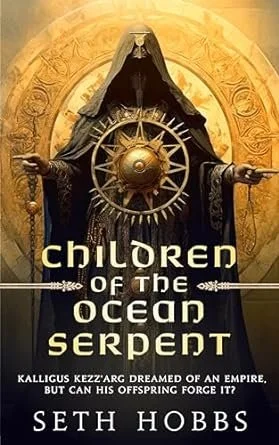Author Interview - Seth Hobbs
What inspired you to write in the fantasy/sci-fi genre, and how does that inspiration reflect in your stories?
A combination of history, fantasy, and living real life. Sometimes real life is fun, and other times it is boring and we need an escape.
Why did you choose the indie author route to publication?
It is difficult to get noticed and waiting for a publishing house will likely never happen for most of us. Even great authors often submitted tons of work before being accepted.
Can you share a bit about the world-building process in your series or novel? How do you balance creativity with consistency?
I try to check and double-check the consistency of characters and places in my books, and I use a lot of things from real life or history to mold into my own creative style.
What unique challenges do you face as an indie author in the fantasy/sci-fi genre, and how do you overcome them?
Getting sidetracked with my main job and other duties. It is also easy to get down and discouraged when it seems your readers are not growing or like you are not getting the notice you hoped for. I just keep working as hard or harder than ever, and enjoy the small successes. I keep telling myself that one day it will all be worth it, and I get enjoyment out of it, even if it never succeeds on the top levels.
Who are your favorite fantasy/sci-fi authors or works, and in what ways have they influenced your writing?
Tolkien, Frank Herbert, George R.R. Martin, Joe Abercrombie, George Orwell, etc. Orwell doesn’t really come to mind all the time as a top fantasy guy, but his insights into history, society, politics, and his warnings of things to come are prevalent in my mind and stories. Watching Game of Thrones gave me a lot of ideas for big, sprawling worlds with lots of power players. Dune really captures the imagination and throws in all sorts of lessons about humanity, ecology, politics, religion, etc.
How do you develop your characters, and who is your favorite character from your works? Why?
My favorite is probably General Rotilla Voxinus. A flawed man with one arm who realizes that the empire he serves is actually run by terrible people, and though he wants to retire and leave, he keeps getting pulled back in, to the point that he is forced to step up and do something about it.
Could you discuss the role of magic/science or fantastical/sci-fi elements in your stories? How do you create rules and limitations for them?
I never really liked books/films with TOO much magic, where anything can be solved by some crazy powers out of nowhere. In my works, there is a dark occult practice of summoning a demonic or alien race, and a few people with sacred knowledge or powers, but even those people are human, and can be easily killed with conventional means, as can the demons if one is strong enough and able to overcome fear. I prefer more realistic approaches to human strengths/weaknesses. One man with a sword is not going to kill 300 men in my books. He is going to die.
How do you approach the plotting and planning of your series or novels? Do you prefer to map everything out beforehand or let the story evolve as you write?
I am more of a gardener, as they say, rather than an architect. I often have a general vision and plant seeds, but I have no idea where many storylines will eventually go. It is fun to tie may strands together later, once I have planted many different seeds and characters. I need time to think and put together other ideas over time, before coming to an ultimate conclusion.
What is a theme or message you hope readers take away from your work?
Liberty and freedom for individuals or nations is the greatest thing we have in this life. God, family, friends, nation, and truth are all important to me, while still being able to showcase the nasty underbelly of bad people and realistic societies.
In what ways do you connect with your readers, and how has their feedback influenced your writing?
I definitely have realized that more women read than men now, especially in fiction, so I am learning to craft different characters and perspectives more than when I first started writing at a younger age.
As an indie author, what advice would you give to aspiring writers wanting to publish in the fantasy/sci-fi genre?
Get ready for a lot of work and hassles, but if it is your passion, never give up on pursuing it. Talk to other authors and readers who can help you get there.
What are the biggest challenges you face as an indie author?
Getting my books into the hands of readers who would be the perfect audience for them and love them.



